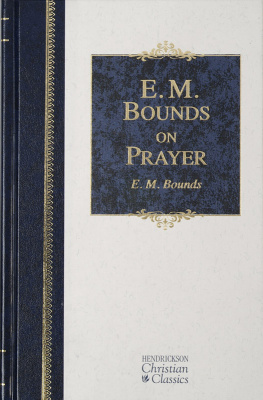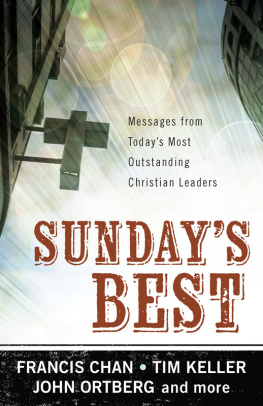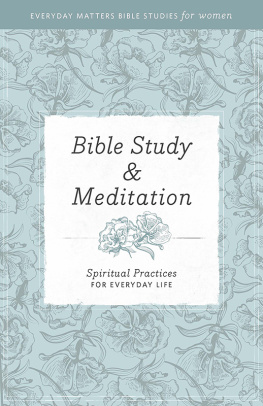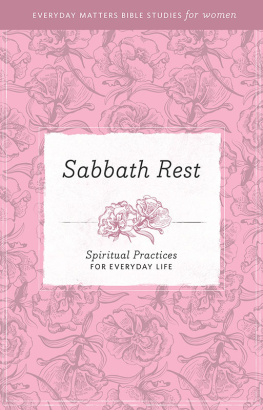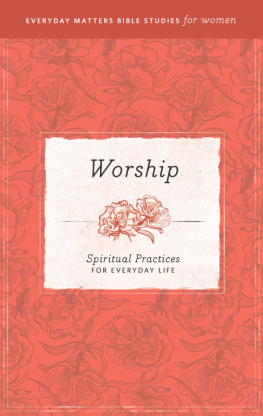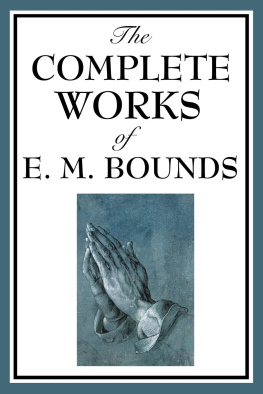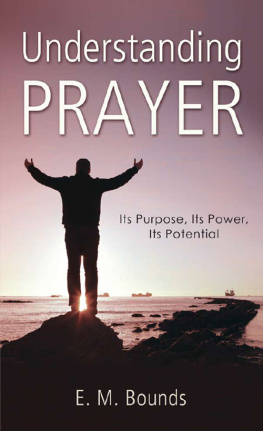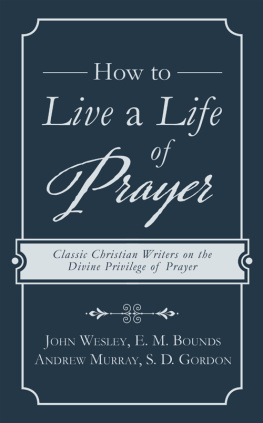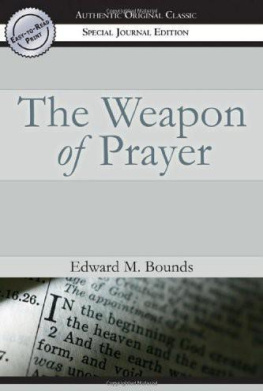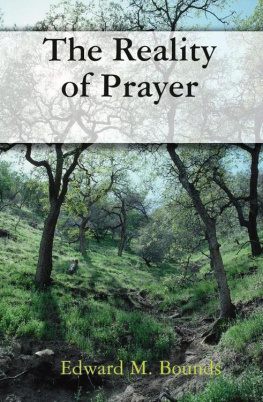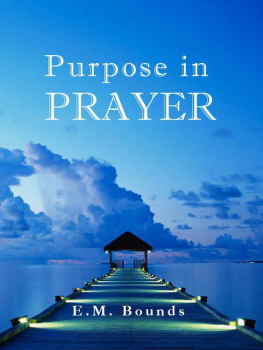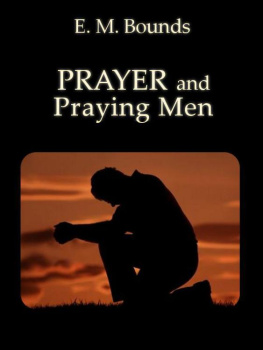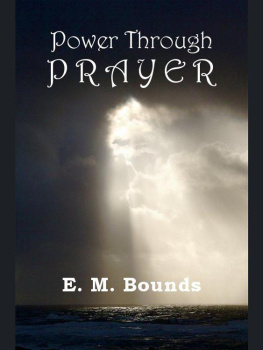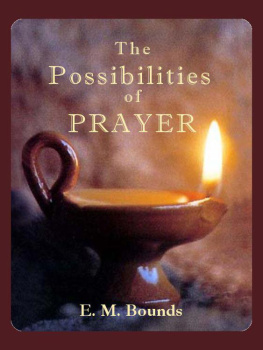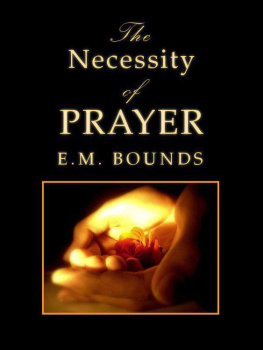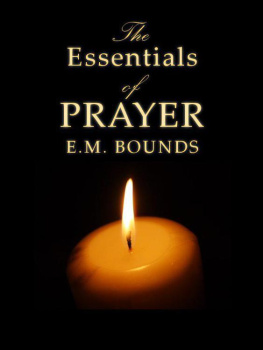All rights reserved. No part of this book may be reproduced or transmitted in any form or by any means, electronic or mechanical, including photocopying, recording, or by any information storage and retrieval system, without permission in writing from the publisher.
Due to technical issues, this eBook may not contain all of the images or diagrams in the original print edition of the work. In addition, adapting the print edition to the eBook format may require some other layout and feature changes to be made.
PREFACE
HENDRICKSON CHRISTIAN CLASSICS EDITION
Edward McKendree Bounds
(18351913)
To pray is the greatest thing we can do: and to do it well there must be calmness, time, and deliberation; otherwise it is degraded into the littlest and meanest of things. True praying has the largest results for good; and poor praying, the least. We cannot do too much of real praying; we cannot do too little of the sham. We must learn anew the worth of prayer, enter anew the school of prayer. There is nothing which it takes more time to learn.
The Power of Prayer
T o look at him, no one would consider him a man of such power. He is described as a slender man, only five feet, five inches tall. He was born on the American frontier, had little formal schooling to speak of, lived through and served in a war that would scar a nation for generations, owned no property or wealth, held no church office, and died in relative obscurity. Yet Edward McKendree Bounds may well be one of the North American churchs best kept secrets. During his lifetime, E. M. Bounds touched thousands of lives through his preaching, his writing, and above all, his praying.
Edward was born 1835 to Thomas Jefferson Bounds and Hester A. Purnell on Shelby County, Missouri, the next-to-the-youngest child in a family of three sons and three daughters. The young Bounds couple had married in 1823, and subsequently moved their young family west from Marylands Eastern Shore in search of opportunity. They wound up in Missouri, where Thomass talents created a comfortable life for his wife and six children. Rather than farm, Thomas turned to construction and local politics. Theirs was a town life, and relatively prosperous.
There is some speculation that Edward McKendree Bounds was named after William McKendree, a circuit riderhis legacy includes churches planted from the Chesapeake Bay to western Missouriand later bishop of the Methodist Episcopal Church, who was passionately committed to evangelism.
Edwards father died when he was fourteen, and we are left to imagine the impact of this loss on his life. But within a few years, he had studied law, passed the bar at eighteen, and was licensed to practice law. He was an ambitious young man: focused, articulate, bright, and a great communicator. In fact, his legal practice was so successful that his next career moved stunned everyone.
In 1859, at the age of twenty four, Bounds had an encounter with God that changed his life altogether. While details are scarce, this second blessing, this new and profound awareness of Gods grace, caused Bounds to surrender his will to Christ and welcome a renewed sense of the presence of the Holy Spirit. He was gifted with the ability to communicate Gods love, and knew Gods call to preaching and evangelism.
For Bounds, the next step was clear. He closed his law office and began an intense regimen of Bible and theological studies. He studied the sermons of John Wesley, and read the stories of great Christian preachers, especially Jonathan Edwards work on the life and work of David Brainerd. By early 1860 he was licensed to preach by the Hannibal Station Quarterly Conference of the Methodist Episcopal Church, South; and by February 1861, Bounds was a pastor of his own congregation in Brunswick, Missouri.
The American Civil War was not merely a war between states, nor did it really begin in 1861. The issues that divided the nation were not merely political or social or economic or moral. Slavery touched every aspect of life in America; people simply engaged the issue at different places. And the conflict over this practice overlapped into all denominations of the Christian church in America, including the Methodist Episcopal Church, which itself was split apart by the issue of slavery in 1845. Out of that split came the denomination called the Methodist Episcopal Church, South.
In the political arena, Missouri was a border state, where opinions about slavery were wide and varied. Though settled by slave state folks from Virginia and Kentucky, by the 1840s, Irish and German immigrants who opposed slavery moved into the state. The dissension and conflict within the borders of Missouri itself epitomized the conflict and dissension that would divide the entire nation. So the stage is set: in February 1861, Edward Bounds was a newly ordained minister in Missouri, a key state to both the Union and the Confederacy. By autumn, America was ripped apart by civil war, and Bounds was imprisoned by the Union Army, along with criminals, rebels and Confederate sympathizers.
Lincoln had sent in Union troops to make sure the state remained Union. Contrary to Lincolns orders, these troops freed slaves and confiscated property, including the church buildings and parsonages that the Methodist Episcopal Church, South had taken with them in their split from the larger body of the denomination in 1845. Anyone who objected was taken prisoner. The troops confronted Bounds as he worked in his church; it was not a building that had even existed when the denomination split, and in Bounds view, should not have been subject to Union reclamation. The soldiers ignored his objections, and took him into custody for his denominational affiliation, saying he was disloyal to the Union.
He was badly treatedtried quickly and sent to a federal prison in St. Louis, where he spent a year and a half. But in prison, Bounds found a new congregation: he became chaplain to the wounded, angry, displaced, fearful men whod been swept up in the chaos of this conflict.
Early in 1863, the twenty-six-year-old Bounds was sent south to be released in Arkansas, forbidden to return home to Missouri by the Union Army. He was never offered the chance to swear his allegiance to the Union, and he was not a slave holder. So even though he had two brothers who served in the Union Army, Bounds found himself, courtesy of the Union Army and his spiritual commitment to his fellow prisoners, allied with the Confederacy. He was a pastor, and he took advantage of the opportunity God gave him to serve: he volunteered for service as a chaplain in the Third Missouri Volunteer Infantry Regiment, pleased to once again be able to minister to fellow Missourians.
Bounds was a good chaplain and a good soldier, always marching with the troops, never avoiding the front lines. He ministered to these men, loved them, encouraged them, and suffered with them until 1864, when his regiment was decimated with thousands of other Confederate troops at the Battle of Franklin. Those left standing were captured and put to work caring for the wounded, and burying the dead in mass graves. The defeated men were then given the opportunity to be released to return home if they signed an oath of allegiance to the United States and promised not to bear arms against the government in the future. E. M. Bounds was one of the troops who signed the oath. He had nothing but the ragged clothes he wore, his Bible, his ordination papers, and his license to preach.

